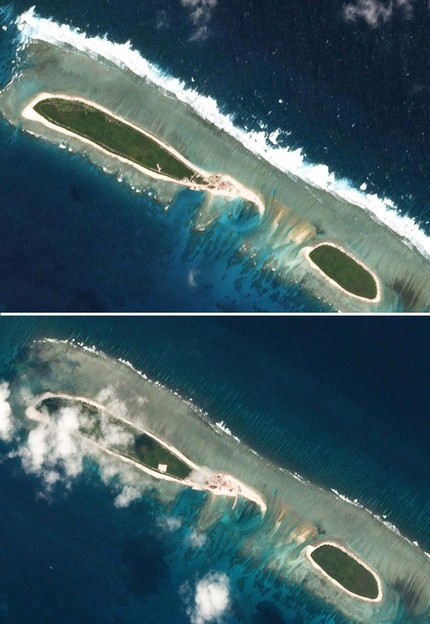© Turkuvaz Haberleşme ve Yayıncılık 2026
China has started fresh construction work in the disputed South China Sea, new satellite images show, a sign that Beijing is continuing to strengthen its military reach across the vital trade waterway.
Regional military attaches and experts believe the work shows China's determination to build up its network of reefs and islets, even if it is seeking to avoid a fresh confrontation with the new administration of U.S. President Donald Trump.
An image of North Island in the Paracels group taken on March 6 shows recent work including land clearing and possible preparation for a harbour to support what experts believe may be eventual military installations. Initial work was damaged in a typhoon last year.

The pictures, provided by private satellite firm Planet Labs, follow reports in January showing work undertaken on nearby Tree Island and other features in the Paracels, which are also claimed by Vietnam and Taiwan.
Diplomats briefed on latest Western intelligence assessments say Beijing is pursuing efforts to dominate its maritime 'backyard', even if it tweaks the timing of moves to avoid being overtly provocative.
"The Paracels are going to be vital to any future Chinese attempt to dominate the South China Sea," said Carl Thayer, a South China Sea expert at Australia's Defence Force Academy.
"We can see they are committed to militarisation, whatever the official rhetoric tells us, even if they are going to do it bit by bit."

The more widely disputed Spratlys archipelago to the south are higher profile but the Paracels are key to China's presence in the South China Sea, China has in recent years temporarily based surface-to-air missile launchers and crack jet fighters at long established bases on Woody Island on the Paracels, helping protect its nuclear submarine facilities on Hainan Island.
However, the U.S. took steps challenging China's assertions in the South China Sea. United States aircraft carrier strike group USS Carl Vinson began patrols in the South China Sea, which caused a tension between the U.S. and China over the disputed waterway, with the latter blaming the former for undermining its sovereignty.
Brunei, Malaysia, the Philippines, Taiwan and Vietnam also claim parts of the waters that command strategic sea lanes and have rich fishing grounds, along with oil and gas deposits.
